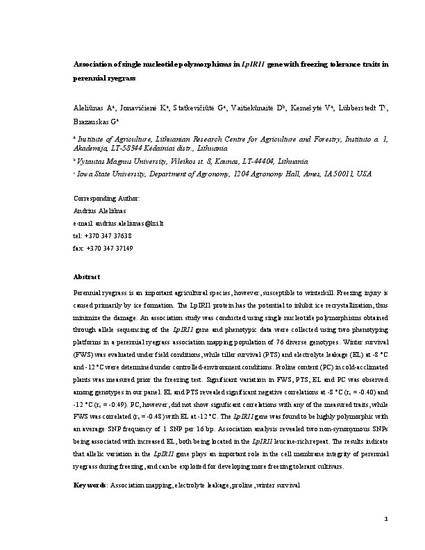
Perennial ryegrass is an important agricultural species, however, susceptible to winterkill. Freezing injury is caused primarily by ice formation. The LpIRI1 protein has the potential to inhibit ice recrystallization, thus minimize the damage. An association study was conducted using single nucleotide polymorphisms obtained through allele sequencing of the LpIRI1 gene and phenotypic data were collected using two phenotyping platforms in a perennial ryegrass association mapping population of 76 diverse genotypes. Winter survival (FWS) was evaluated under field conditions, while tiller survival (PTS) and electrolyte leakage (EL) at -8 °C and -12 °C were determined under controlled-environment conditions. Proline content (PC) in cold-acclimated plants was measured prior the freezing test. Significant variation in FWS, PTS, EL and PC was observed among genotypes in our panel. EL and PTS revealed significant negative correlations at -8 °C (rs = -0.40) and -12 °C (rs = -0.49). PC, however, did not show significant correlations with any of the measured traits, while FWS was correlated (rs = -0.48) with EL at -12 °C. The LpIRI1 gene was found to be highly polymorphic with an average SNP frequency of 1 SNP per 16 bp. Association analysis revealed two non-synonymous SNPs being associated with increased EL, both being located in the LpIRI1 leucine-rich repeat. The results indicate that allelic variation in the LpIRI1 gene plays an important role in the cell membrane integrity of perennial ryegrass during freezing, and can be exploited for developing more freezing tolerant cultivars.
Available at: http://works.bepress.com/thomas-lubberstedt/71/

This is a post-peer-review, pre-copyedit version of an article published in Euphytica. The final authenticated version is available online at: http://dx.doi.org/10.1007/s10681-014-1330-y.